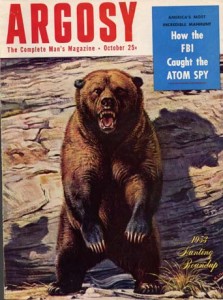As I stated earlier, I decided to make the protagonist of my first novel an amateur sleuth. As all other decisions in getting started on a novel, I worried about this quite a lot because it™s a sure groaner. As in, sure to make people groan when they hear that. But after some consideration, I decided to stick with it.
The amateur sleuth I have in mind is based, loosely, on my situation: a married, middle-aged man, late-term dad with an eight-year son old to watch, and most tellingly, a work at home dad. As opposed to a stay at home dad. The distinction becomes important because a character who gets killed in the first chapter is a stay at home dad. As opposed to a work at home dad.
So, two issues: (1) how to make the protagonist a lot more interesting than I am, and (2) how to deal with my own embarrassment when I tell people that yes, really, it™s yet an amateur sleuth story.
As to the character, I started by searching for any other novels with amateur sleuth stay or work at home dad. And sure as hell, I found one: The Aaron Tucker series, a trilogy written by Jeffery Cohen. So I bought the books and read them.
I have to say, I wasn™t all that impressed with the main character. (If you™re reading this Jeffrey, sorry. You probably won™t like my stuff all that much either. I™ll buy you a beer if you™re ever in California and we can talk about it.) What I found lacking was that the protagonist and his at-home situation seemed too close to what I could easily imagine was the author™s real life (happily married with two children, including an autistic son whose behavior often takes center stage). What I took away from the trilogy was that to the extent I base any character on a real person, I should make sure to untether the character from the person. Maybe exaggerate a trait, say, or invent entirely new ones. Start with the template of a real person maybe, but make sure that character isn™t bound by that person™s personality, at least as I see it.
Is that how it works? I don™t know, but it™s working so far.
As to the whole amateur sleuth thing, I found a fantastic resource online that has allowed me to think about an amateur sleuth not as a cliché, but as a trope. The difference is everything. The site is called TV Tropes. The website is actually a wiki dedicated to identifying tropes in TV and other media.
Tropes are devices and conventions that a writer can reasonably rely on as being present in the audience members’ minds and expectations. On the whole, tropes are not clichés. The word clichéd means “stereotyped and trite.” In other words, dull and uninteresting. We are not looking for dull and uninteresting entries. We are here to recognize tropes and play with them, not to make fun of them.
The editors further define trope as œa conceptual figure of speech, a storytelling shorthand for a concept that the audience will recognize and understand instantly.
The wiki, œa buttload more informal than Wikipedia, has a lot of fun identifying and explicating tropes. It™s really worth perusing the site, if nothing else just to look at the article titles (e.g., œLittle Old Lady Investigates, œReverse Whodunit, œAlone With the Psycho, œAsshole Victim).
Anyway, so now when I think of my amateur sleuth, I think of him as an Amateur Sleuth, a type which any reader will load with baggage from past amateur sleuths like Miss Marple, the Hardy Boys, Jessica Fletcher (Murder, She Wrote), The Harts (Hart to Hart) and others. And knowing something about what expectations readers have, I can rely on those to streamline aspects of the plot, or of the main character. I can play around inside the conventions (by creating a variation on the Busman™s Holiday, another trope) or think about playing with the genre by subverting expectations. The important thing is to remember to use the trope as framework, and to avoid slipping into cliché.
Can I really do any of that? I don™t know. But it™s fun to think about. And at least I™m not so embarrassed about what I™m writing that I™m frozen at square one.


